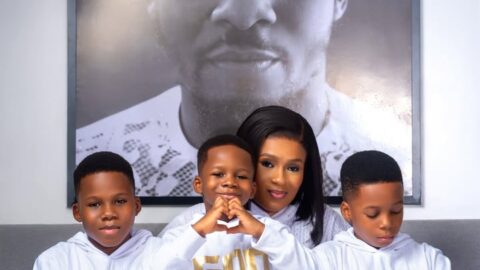Nollywood star, Kalu Ikeagwu, has taken a brave step forward by shedding light on his personal encounter with domestic violence during a turbulent phase of his life.
In an open and heartfelt interview with Punch, the acclaimed actor recounted the painful experience of being trapped in a toxic relationship and the tough journey it took to survive and eventually escape the ordeal.
Reflecting on the beginnings of that dark period, Ikeagwu admitted that, like many young people, he had missed or ignored early warning signs.
He confessed, “Yes, I have experienced toxic relationships and ignored red flags, as most young people would.”
His candid admission underscores a common yet often unspoken reality — that even those who seem strong and successful can find themselves entangled in damaging emotional environments.
Speaking further, Ikeagwu emphasized the critical lessons he learned from his experience, noting the importance of early detection of unhealthy behaviors.
“I learnt very quickly to spot those red flags early on and to never assume people can or will change,” he said with conviction.
Drawing on a vivid metaphor, he added, “A leopard does not change its spots.” His words serve as a stern reminder that it is dangerous to hope that deeply ingrained patterns of toxic behavior will miraculously disappear.
When asked how he managed to endure and navigate through the violence he faced, Ikeagwu pointed to his faith as his anchor. “The fear of God kept me in check,” he stated solemnly. Describing his coping mechanism, he explained, “I remained calm, removed all emotion from the situation and maintained complete control until the escalation died down.”
His strategy highlights the critical role of emotional discipline and inner strength when confronting emotionally charged and abusive encounters.
Looking back now, Ikeagwu expressed profound gratitude for having survived the experience and emerged stronger. “Today, I am much the better for it,” he said, a hint of relief in his voice. “I thank God I trusted Him through the process. I am still benefitting from it till tomorrow.”
His testimony is a powerful message of hope for anyone currently grappling with similar hardships — a reminder that healing and growth are possible beyond trauma.
Moving beyond his personal story, Ikeagwu offered some practical advice for individuals seeking lasting and healthy relationships. He stressed the importance of choosing partners who have a genuine fear of God.
“There is no point being a hypocrite demanding from someone else what you refuse to touch,” he asserted, pointing out that the values we seek in others must first be cultivated within ourselves.
His words highlight the necessity of shared spiritual and moral foundations in relationships.
Additionally, Ikeagwu emphasized the need for thorough family background checks before committing to a relationship. He remarked, “A person is the product of the family they come from. A violent or dysfunctional family can only produce a violent or dysfunctional individual.”
By stressing the significance of understanding a partner’s upbringing, he warned that unresolved generational issues can easily seep into new relationships if left unchecked.
On the broader topic of toxic relationships and domestic violence, Ikeagwu shared his observations about why these problems persist so strongly in Nigeria, despite the existence of laws meant to curb them.
“I think raising awareness about domestic violence and toxic relationships is a good thing to wake people up to the reality that these two maligning issues are on the increase in society,” he noted.
His comments point to the essential role of awareness campaigns in driving societal change.
However, the actor did not shy away from expressing his skepticism about the real impact of media campaigns if the root causes are not tackled.
“I think a deluge of media coverage on domestic violence would have little or no impact if the cause of the prevalent violence is not addressed,” he warned.
His words suggest that while conversations are important, they must be accompanied by deeper societal introspection and reform.
Turning his attention to Nigeria’s legal landscape, Ikeagwu shared his belief that the country’s laws are, in principle, adequate to protect vulnerable groups.
“I feel that Nigerian laws are sufficient enough to protect women and children from domestic violence,” he said.
Nonetheless, he expressed deep concern over the gap between the existence of these laws and their actual enforcement.
According to Ikeagwu, the real problem lies not with the written statutes but with the institutions responsible for enforcing them. “Are the justice system and the authorities doing enough to protect them? I don’t think so,” he declared.
He pointed to a lack of political will, systemic inefficiency, and other deep-seated issues as key reasons why domestic violence continues to thrive unchecked in many communities.
In closing, Ikeagwu emphasized that without the genuine commitment of the authorities to enforce laws and punish offenders appropriately, efforts to combat domestic violence will remain largely cosmetic.
“There is a lack of will for various reasons — political and otherwise — to adequately enforce the law to punish the perpetrators of violence and deter would-be offenders. This could be the major reason for the increase in domestic violence,” he concluded.
His passionate remarks call for urgent and meaningful action beyond mere words to bring an end to the scourge of domestic violence.








